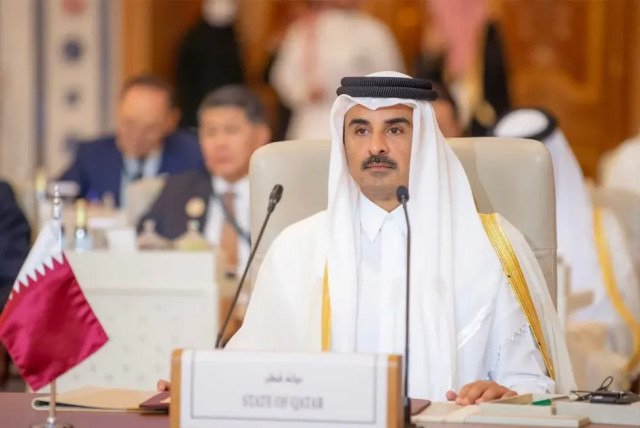US policy on Iran: No deal, no cash, no ceasefire - analysis

What is US policy on Iran now that everything fell apart, and how does this impact Israel?
When US President Joe Biden took office in 2021, he believed he had a simple idea for resolving, or at least postponing, any nuclear crisis with Iran until late 2025, meaning it would not be an issue during his first term.
The strategy was a return to the 2015 nuclear deal known as the Joint Comprehensive Plan of Action (JCPOA) under the same principles of sanctions relief and money for the Islamic Republic to freeze or delay its progress toward a nuclear weapon for a certain number of years.
About three years into Biden’s administration, the strategy is scuttled.
There has been no deal with Tehran, and US officials recently suggested there will be none before the next US presidential election.
An informal deal struck over the summer that led to the return of American hostages held by Iran and the ayatollah’s proxies halting attacks on US troops in the Middle East – in exchange for partial sanctions relief to the Islamic Republic to the tune of $6 billion – also fell apart.
Hamas jumped the gun
Starting in mid-August, the US facilitated South Korea transferring $6b. to Qatar over several weeks.
Had Hamas waited to launch its attack on Israel for another month, that $6b. probably would have already been in Iranian hands.
In fact, the Islamic Republic had even slowed the rate at which it was enriching uranium and increased its cooperation with IAEA nuclear inspectors in anticipation that the informal partial deal could lead to bigger things.
But Hamas jumped the gun, and the US slapped a freeze on Qatar giving the funds to Tehran, as it held the Islamic Republic partially responsible for the Gaza terrorist group’s attack on Israel and for destabilizing the region with Hezbollah in Lebanon and the Houthis in Yemen.
This point has been overlooked by many, with some top analysts still writing as if these funds got to Iran; in fact, they were closed off to Iran at almost the last moment because of the current war.
Maybe Iranian Supreme Leader Ayatollah Ali Khamenei would have ordered proxies in Iraq and Syria to attack American troops anyway out of anger at the US for assisting Israel to fight Hamas and for moving naval warships into the region.
Yet, it seems pretty clear that another reason for the spike in attacks was that the US blocked the final transfer of the funds mid-deal after the American hostages had already been freed (some Iranians in prison in the US convicted of national security crimes were also released by the US).
Iran may also have harmed its own case, thinking that once the funds were in Qatar and it had released US hostages, it could flex its muscles everywhere, including when it kicked out IAEA inspectors on September 16, just two days before the hostages were released.
All of this brings us up to December 7, when Kurt Campbell, Biden’s nominee for deputy secretary of state, told the US Senate Foreign Relations Committee that a return to the JCPOA was “just not on the table.”
Of course, this is not the first time that US officials have said this.
Famously, Biden was recorded at the end of 2022, without his knowledge, telling a private citizen at an event that the deal was “dead.”
And yet, after that, Biden and his team still managed to nearly bring pieces of the deal back this past summer, and absent Hamas’s invasion, Khamenei would be bathing in $6b. in cash that he could spend on his nuclear and global terrorist aspirations.
What is different this time is US Election Day in November 2024 is less than 11 months away.
Absent a quick end to the current war, and some rapid restoration of the informal deal from this summer, there just will not be time, and it will be too risky for Biden to cut any kind of deal with the Iranians.
Likewise, Khamenei has little incentive to cut a deal without knowing which version of the US he will be facing a year from now: Biden or possibly the second coming of Donald Trump.
Some Israelis might celebrate this moment.
Khamenei has been, at least temporarily, deprived of $6b. they believed he would get for his nuclear and terrorist programs.
Also, some Israelis feared the informal deal would lead to a bigger deal and a full repeal of sanctions on Iran.
But those criticizing the JCPOA, with all of its well-known holes, have never really come up with a “Plan B” of how to stop Tehran’s continued progress toward a nuclear weapon.
How do JCPOA critics plan to keep the Islamic Republic “in the box” for all of next year while there may not even be a potential diplomatic horizon in place?
What happens if Khamenei finally decides to challenge Israel’s longtime threat (or call its bluff) to strike his nuclear program if the ayatollahs ever decided to break out and make a bomb?
A diplomatic solution or delaying Iran with covert Mossad operations seem to be the only methods to delay Iran getting the bomb and potentially launching all out war.
Jerusalem Post Store
`; document.getElementById("linkPremium").innerHTML = cont; var divWithLink = document.getElementById("premium-link"); if (divWithLink !== null && divWithLink !== 'undefined') { divWithLink.style.border = "solid 1px #cb0f3e"; divWithLink.style.textAlign = "center"; divWithLink.style.marginBottom = "15px"; divWithLink.style.marginTop = "15px"; divWithLink.style.width = "100%"; divWithLink.style.backgroundColor = "#122952"; divWithLink.style.color = "#ffffff"; divWithLink.style.lineHeight = "1.5"; } } (function (v, i) { });

